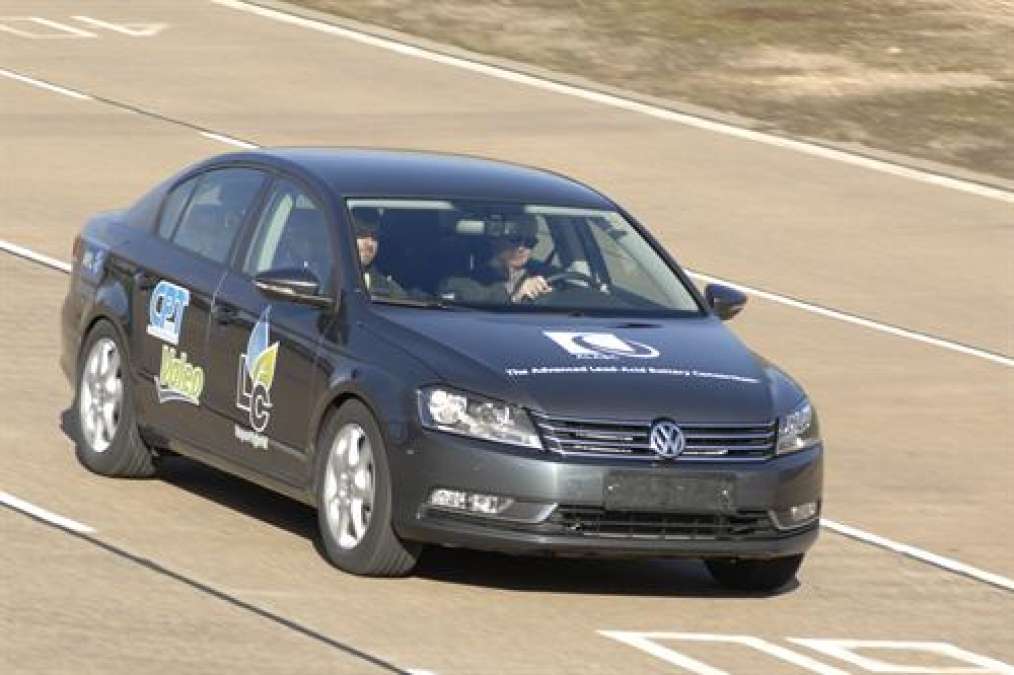Conceived by Controlled Power Technologies (CPT) and the Advanced Lead-Acid Battery Consortium (ALABC), the LC Super Hybrid is a micro-mild demonstrator showcasing the capabilities of a new low-voltage hybrid-electric system. The demonstration vehicle is a Volkswagen Passat, which is available at market in both gasoline and diesel configurations, making it an excellent comparison model. With their system, the CPT-ALABC team was able to achieve 42 miles per gallon (mpg US) with CO2> emissions under 130g/km.
The technology is production-ready, says CPT, and offers the potential of mass-market, gasoline-fueled vehicles with lower cost than their equivalent diesel model. The micro-mild hybrid system they've developed, their demonstration hopes to show, can enable aggressive, near-term downsizing and down-speeding of existing engine families to give significantly better efficiency using existing and easily-integrated technologies.
To debut at the Geneva Motor Show this week, the LC Super Hybrid demonstrator shows the VW Passat they've converted and compares that to the fuel consumption and emissions of the base 1.4-liter TSI as well as the larger 1.8-liter TSI gasoline models of the car and the more expensive TDI clean diesel model. The micro-mild technology adds some cost to the 1.4L model, but significantly raises fuel economy and gives much better emissions standards at a cost that is lower than the TDI model's base price - making it much cheaper than a full hybrid system as well.
How significant are the advantages? The car achieves 8% lower CO2 emissions than the 1.4L gasoline and 23% lower than the 1.8L option. It nearly halves the diesel's emissions.
The technologies being used are an electric supercharger from Valeo (designed by CPT and now on the market), a next-generation starter-generator with advanced belt tensioning system, carbon-enhanced valve-regulated lead-acid (VRLA) batteries, and higher gear ratios for reduced engine speeds.
The 1.4-liter base engine put out 120hp in the Passat and CPT raises that to 140hp (200 goes to 275 Nm of torque), making the smaller engine more compatible with the larger 1.8L option. This comes thanks to the supercharger and puts the output near a 2.0-liter engine's power while dropping fuel consumption into the diesel engine's range.
Tuning the gearing in the Passat's transmission increases acceleration times and optimizes engine speeds at various road speeds to improve efficiency while greatly improving performance. The 1.4L demonstrator has a 0-62 mile acceleration of 8.7 seconds, very close to the 1.8L's 8.5 second time.
Using the SpeedStart stop-start system, which includes the advanced starter-generator as well as intelligent torque and current control, efficiencies are further boosted. The starter operates at 12 volts, meaning no major changes to the car's electrical systems were required, further reducing costs of integration. A highly controllable switched reluctance motor-generator in low voltage is of simple, robust design made mostly of steel, aluminum and copper and avoids use of rare earth metals, making it cheaper to produce than switched reluctance motor-generator tech (now commonly employed in hybrids and electrics). The motor comes from Nidec in Japan, one of the leading suppliers of electric motors world-wide.
An added Mubea belt tensioner system facilitates the ability to rapidly reverse the motor-generator while nearly halving the belt's loads, which reduces friction and saves both belt wear and engine load. The start-stop system further reduces both emissions and fuel consumption.
Finally, the carbon-enhanced lead-acid battery design from Exide Technologies (another world-leading supplier) maximizes energy recuperation (via regenerative braking) during deceleration without the need of supercapacitors. This allows the system to retain its 12V operation while enhancing the storage capacity and absorption speed of the batteries. Without resorting to much more expensive lithium-ion derivatives.
The entire system adds only 79kg to the total curb weight of the vehicle and can also be used in a 48V configuration for even better returns in economy and emissions (better than 25%), but at the expense of requiring extra systems to integrate the higher voltage into the existing 12V standard in vehicles.
Additional costs to vehicle manufacturers to include the LC Super Hybrid concepts are estimated to be $1,000 to $2,000 for most existing 4- and 6-cylinder gasoline vehicles. Those using advanced fuel injection (such as TSI) are cheaper to integrate with than those which do not. Costs would be significantly higher for the 48V configuration's use.
We are confident we have met the challenge facing the automotive industry for cost efficient CO2 reduction technology, compatible with legislative demands and at showroom prices that consumers are willing and able to afford. There is no huge upfront cost with this technology and therefore no need for expensive subsidies from the taxpayer.--Allan Cooper, European projects coordinator at ALABC
Technical details and demonstrations as well as published findings will be shown at the 5th International Advanced Mobility Forum (IAMF) while the demonstrator vehicle and a shorter presentation will be shown at the Geneva Motor Show this week.





